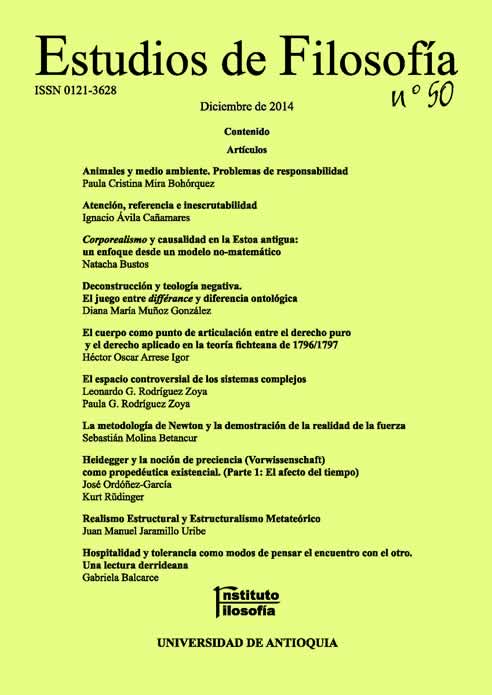Attention, reference, and inscrutability
DOI:
https://doi.org/10.17533/udea.ef.21137Keywords:
Quine, Campbell, inscrutability of reference, relational theory of attentionAbstract
In this paper I discuss John Campbell’s criticism of the Quinean thesis of the inscrutability of reference. First I claim that Campbell’s arguments miss the point because he overlooks the link Quine draws between reference, quantification, and ontology. Then I discuss another line of thought against inscrutability that appeals to Campbell’s relational view on attention. Finally, I suggest that this line –though insufficient and in need of a complement– brings out the fact that behind the views held by these authors on the topic of reference there are important philosophical ideals which should be discussed.
Downloads
References
Campbell, J. (2002a). Reference and Consciousness. Oxford: Oxford University Press.
_________ (2002b). Berkeley’s Puzzle. En T. S. Gendler, & J. Hawthorne (Eds.), Conceivability and Possibility, (pp. 127–143). Oxford: Oxford University Press.
_________. (2009). Consciousness and Reference. En B. McLaughlin, A. Beckermann & S. Walter (Eds.), Oxford Handbook of Philosophy of Mind, (pp. 648–662). Oxford: Oxford University Press. DOI: https://doi.org/10.1093/oxfordhb/9780199262618.003.0038
Hylton, P. (2000). Reference, Ontological Relativity, and Realism. Proceedings of the Aristotelian Society, Volumen suplementario 74, 281–299. DOI: https://doi.org/10.1111/1467-8349.00072
_________. (2004). Quine on Reference and Ontology. En R. F. Gibson (ed.), The Cambridge Companion to Quine, (pp. 115–150). Cambridge: Cambridge University Press. DOI: https://doi.org/10.1017/CCOL0521630568.006
Nagel, T. (1986). The View from Nowhere. Oxford: Oxford University Press.
Quine, W. V. (1960). Word and Object. Cambridge Mass: MIT Press.
_________. (1969). Ontological Relativity. En Ontological Relativity and Other Essays, (pp. 26–68). New York: Columbia University Press. DOI: https://doi.org/10.7312/quin92204-003
_________. (1974). The Roots of Reference. La Salle: Open Court.
_________. (1983). Ontology and Ideology Revisited. Journal of Philosophy 80, 499–502. DOI: https://doi.org/10.2307/2026110
_________. (1992). Pursuit of Truth. Revised Edition. Cambridge Mass. / London: Harvard University Press.
_________. (1993). In Praise of Observation Sentences. Journal of Philosophy 90, 107–116. DOI: https://doi.org/10.2307/2940954
_________. (1995a). From Stimulus to Science. Cambridge Mass. / London: Harvard University Press.
_________. (1995b). Reactions. En P. Leonard & M. Santambrogio (Eds.), On Quine: New Essays (pp. 347–61). Cambridge: Cambridge University Press.
_________. (1999). Where do we disagree? En L. E. Hahn (Ed.), The Philosophy of Donald Davidson, (pp. 73–80). Chicago y La Salle: Open Court.
Williams, B. (1978). Descartes: The Project of Pure Enquiry. Harmondsworth: Penguin.
Published
How to Cite
Issue
Section
Categories
License
Copyright (c) 2014 Ignacio Ávila Cañamares

This work is licensed under a Creative Commons Attribution-NonCommercial-ShareAlike 4.0 International License.
Authors who publish with this journal agree to the following terms:
1. The Author retains copyright in the Work, where the term "Work" shall include all digital objects that may result in subsequent electronic publication or distribution.
2. Upon acceptance of the Work, the author shall grant to the Publisher the right of first publication of the Work.
3. The Author shall grant to the Publisher a nonexclusive perpetual right and license to publish, archive, and make accessible the Work in whole or in part in all forms of media now or hereafter known under a Creative Commons Attribution-NoCommercia-ShareAlike (CC BY-NC-SA 4.0), or its equivalent, which, for the avoidance of doubt, allows others to copy, distribute, and transmit the Work under the following conditions: (a) Attribution: Other users must attribute the Work in the manner specified by the author as indicated on the journal Web site;(b) Noncommercial: Other users (including Publisher) may not use this Work for commercial purposes;
4. The Author is able to enter into separate, additional contractual arrangements for the nonexclusive distribution of the journal's published version of the Work (e.g., post it to an institutional repository or publish it in a book), as long as there is provided in the document an acknowledgement of its initial publication in this journal;
5. Authors are permitted, and Estudios de Filosofía promotes, to post online the preprint manuscript of the Work in institutional repositories or on their Websites prior to and during the submission process, as it can lead to productive exchanges, as well as earlier and greater citation of published work (see The Effect of Open Access). Any such posting made before acceptance and publication of the Work is expected be updated upon publication to include a reference to the Estudios de Filosofía's assigned URL to the Article and its final published version in Estudios de Filosofía.















